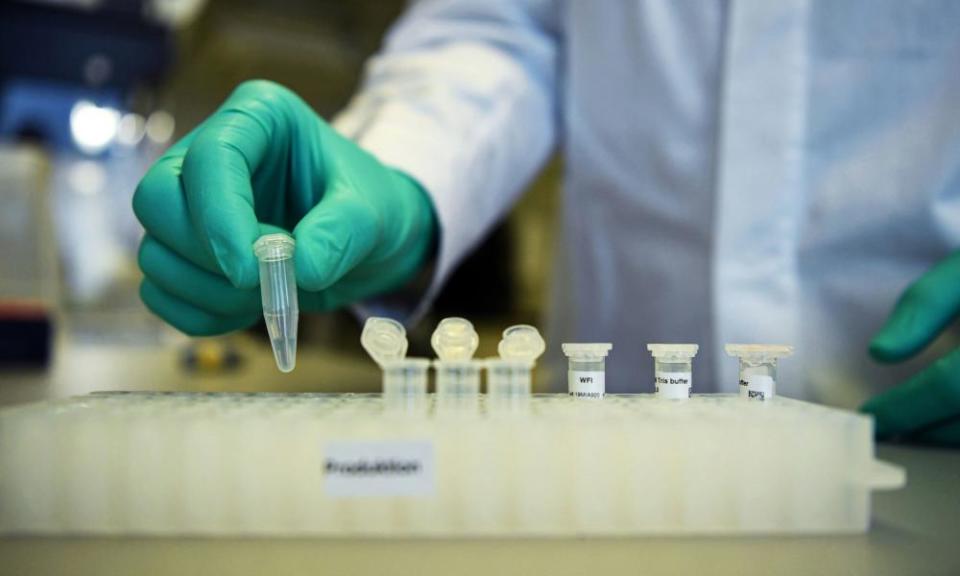GlaxoSmithKline makes bold move with £130m Covid-19 investment

Monday’s most important vaccine news was the promising early data from the Oxford University and AstraZeneca coronavirus trial – “robust immune responses” is encouraging. But let’s not overlook other vaccine developments. The industry has been viewed for years as a dull subsector of the pharmaceutical business; now it is a whir of deal-making activity.
GlaxoSmithKline, already one of the world’s biggest vaccine makers, leaped into action by paying £130m for a 10% stake in German group CureVac, the company that briefly registered on President Trump’s radar (he suggested the US should buy the firm for its Covid-19 possibilities).
CureVac, alongside the likes of fellow German group BioNTech and Moderna of the US, is a pioneer of the messenger ribonucleic acid (mRNA) approach to vaccine development. Instead of injecting an antigen to trigger an immune response, the approach tries to encourage the body itself to produce the necessary protein. It’s pioneering stuff but, if it works, the idea is that development and production schedules could shorten radically.
GSK will not have a role on CureVac’s Covid-19 programme, though it will obviously have exposure via the equity stake. Instead, the prime interest will come via five research projects for which GSK is providing £104m of funding. Those programmes are yet to be named but, if they are successful, the milestone payments would be multiples of the initial sum. So there is potential for this to be a big deal.
GSK’s share price was virtually unmoved since the adventure is still only a long-term bet that carries obvious scientific uncertainties. But it is further evidence of GSK’s increased willingness to take more punts, even if, on this occasion, the other rationale will be to defend a historic strength in vaccines (for shingles, meningitis and so on).
A greater appetite for risk-taking investments has paid off spectacularly for AstraZeneca in oncology in the past five years. GSK, which has been left standing in share price terms, now seems to be taking the same bolder approach under chief executive Emma Walmsley. There are no guarantees, but being big in vaccines suddenly looks a much-needed point of advantage for GSK.
Change – the only constant at M&S
Marks & Spencer has been in restructuring mode for about two decades, so there’s no surprise that Covid-19 should produce more of the same. Most traditional retailers, from John Lewis to Boots, are in retreat and M&S chief executive Steve Rowe had signalled job cuts in the offing in May with his “never the same again” riff on the pandemic’s effect on shopping habits.
If anything, the intended loss of 950 jobs at M&S from a workforce of 78,000 probably counts as a smaller retrenchment than feared given the corporate ambition to complete three years’ worth of restructuring in 12 months. Store management posts, plus head office roles in property and operations, are the target this time.
Shareholders, then, can expect more exceptional charges. To put it mildly, the “adjustments to reported profits” line tends to be busy at M&S. An astonishing £1.9bn of adjustments (always downwards, naturally) have been clocked up in the past five years as stores have closed, the value of freeholds been written down and so on. The end to restructuring, unfortunately, is not yet in sight.
Walmart fishing for a nibble at Asda
Roll up, roll up, who wants to buy Asda? Or, if you don’t fancy the whole thing, how about an ownership slice? Yes, US parent Walmart is looking for buyers or investors for its supermarket chain again, having received “renewed inbound interest”.
It is hard, though, to believe the pandemic has boosted Asda’s value. Becalmed share prices among the quoted UK supermarket chains tell the story: extra online demand from shoppers has not translated into a profits boom because operating costs have also soared.
An investor in Asda at this point must also assume consolidation among the big four UK chains is impossible. The Competition and Markets Authority rightly killed a planned takeover by Sainsbury’s last year and its analysis may apply for a generation. Walmart will find somebody if it drops its valuation of Asda low enough, but there’s an air of desperation about this on-off auction.

 Yahoo Finance
Yahoo Finance 